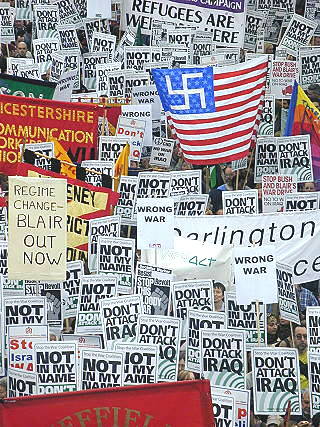Ramstein
Struck
Bürger in Uniform
Scholz
Mainz
# Blitzschulung
# was geht?
Ein Überblick über die juristischen Auseinandersetzungen, die
Schröder am Hals hat
# Herr Eu und Frau
Usa
# Der deutsche
Krieg
#e
über die mögliche Breite der Anti-Kriegs-Bewegung
# Über
die angebliche Sinnlosigkeit, auf dem Recht zu bestehen
#e Interessante
Parallelen zwischen McVeigh und NATO- Kriegsverbrechern
# Was
Großvater noch wußte
# 7 gute Gründe, auf
dem Recht zu bestehen
PDS
- Partei des Grundgesetzes.
Plädoyer für ein klares Profil - nach
innen und außen
Demand an Investigation
And then, what happens when you still don't know what really happened
on Sept. 11? So much of the real story has been classified, and so much
of the evidence has been suppressed, that of course you cannot possibly
know. And this is the point when you need to ask: Why don't you know? How
does "homeland security" justify keeping any secrets about what already
happened on Sept. 11? The terrorists know exactly what they did, so the
secrets are mainly being kept from you, the American public. What is the
reason for keeping the details of 9/11 suppressed? What do members of the
U.S. government want to hide? Starting with Dick Cheney, the most stubborn
and consistent opponent of an independent 9/11 commission?
Clearly, those who would know the truth must organize to demand it,
and search for it themselves. That is the only avenue open to us.
If you have caught the government lying enough times, when
do you stop assuming that they ever tell the truth? When is it enough for
people to begin conducting their own investigation?
Conspiracy and Analysis
Aha, that tired all-purpose argumentative bludgeon, "conspiracy theory."
The official story of 9/11 is a conspiracy theory. It posits a conspiracy
of Islamist terrorists who caught their adversaries entirely by surprise.
For many years, Americans were told they faced the specter of an organized
Communist plan to overthrow the Free World. Why wasn't that dismissed as
a "conspiracy theory"?
An institution that works in secrecy is by definition conspiratorial.
Two or more people planning to conceal a course of action can qualify as
a conspiracy under the law. Law books are full of conspiracy statutes,
and these allow for consideration of circumstantial evidence. Conspiracies
are not everywhere, but to look for signs of secret machinations in mysterious
political events is natural and sensible.
In practice, those who attack with the "conspiracy theory" label
generally do so to discredit lines of investigation that suggest U.S. government
complicity or involvement in crimes. Yet history has seen all manner of
such criminal involvement, not just by the U.S. government, but by most
governments. There is nothing unusual about conspiracies per se. They are
the stuff of normal power politics.
The conspiracy theory label is easily wielded by those who are too
lazy to think for themselves, or who do not want to learn the actual details
of history and politics.
We move in a world of appearances and deceptions. How do we evaluate
what happens behind the official scenes? How do we explore connections
among power brokers and power elites? Should we not investigate deep politics,
meaning the decision-making processes that are hidden from democratic control?
Should we not investigate parapolitics, the decisions made in secret by
self-appointed, informal groups such as mafias, spook networks, and other
secret societies? If we are interested in politics, then we need to study
hidden connections in a way that is often attacked as conspiracy theory.
Many of the "anti-conspiratorialists" suffer from obvious institutional
or ideological blindspots. Among the most stubborn are a brand of left-liberal
intellectuals who dismiss the existence of parapolitics because it conflicts
with their commitment to neatly-defined social theory. Certain kinds of
leftists hate thinking there is anything they don't already know, or that
is not accounted for in their prefabricated models.
Genuine scholarship does not entrap itself in spurious abstractions
like "conspiracy theory" versus "institutional theory." To take either
option as a preferred methodology sets up a rigid paradigm and determines
our conclusions in advance. When we choose one or the other, we always
see "conspiracies" or "institutions" as the root of all social phenomena.
In genuine practice, the study of elites ("conspiracy") and the
study of structures ("institution") tend to yield microscopic and macroscopic
views of the same phenomena. In other words, "conspiracy" is micro and
"institution" is macro, although the terms are both of limited descriptive
value, since both suggest something essential and timeless. Time was when
social analysts preferred vigorous and truly descriptive terms, terms like
elite, class, interest, structure, power, dynamic, peoples. This is a set
of terms that can describe actors making decisions according to mindset,
perception, and resources, and within constantly evolving constraints and
situations.
Real analysis begins with <i>empirical</i> observation and
derives hypotheses by using logic. Real reflection hunts for the paradigms
that predetermine our thinking, in an effort to overcome them, to go beyond
them, and not to enshrine or condemn them.
Jack Riddler
www.osamaskidneys.com |
